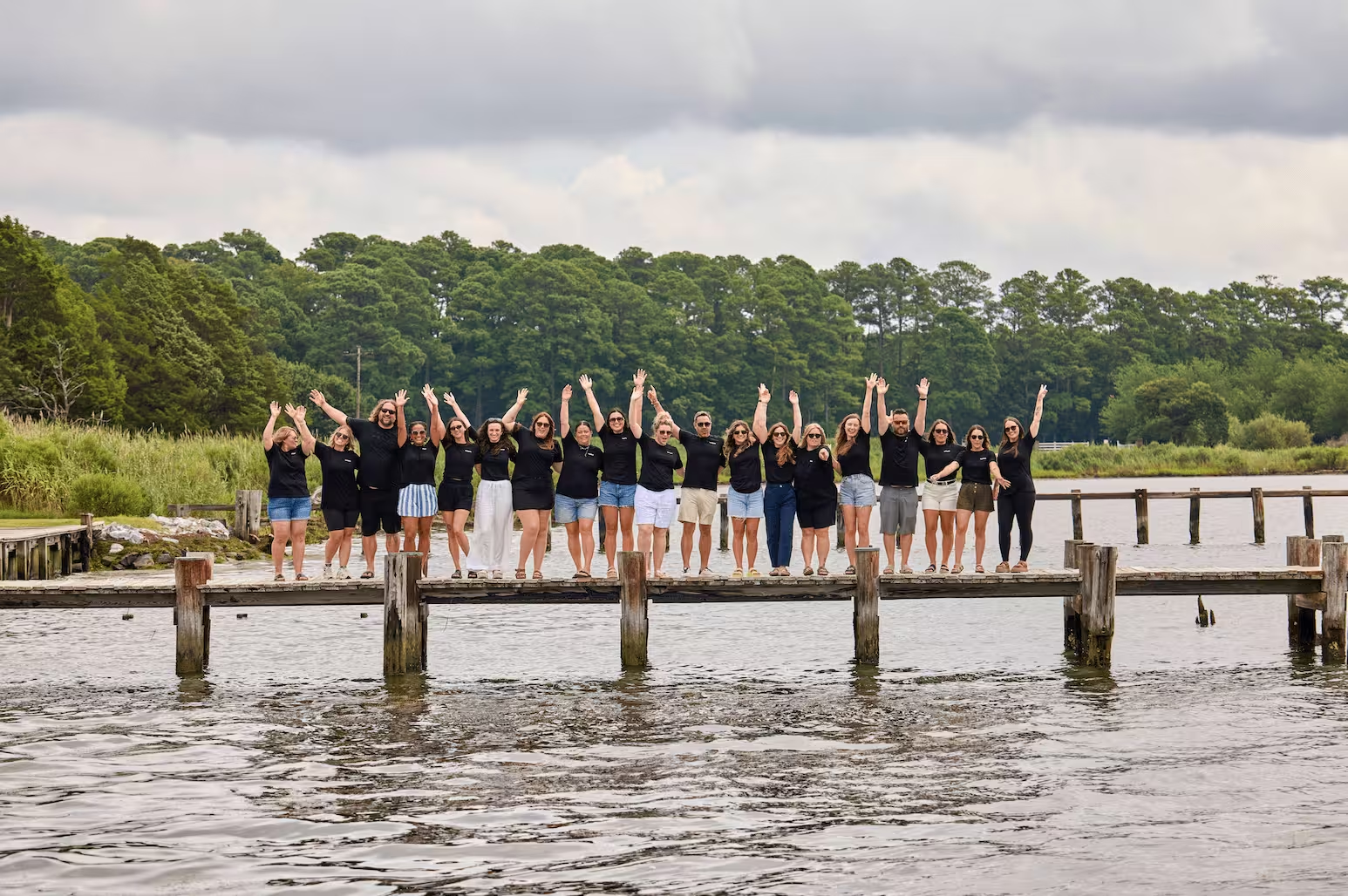Try Our Retreat Budget Estimator Tool!

Retreat Budget Estimator Tool
How It Works
Accommodation
Usually the biggest piece of the puzzle, where you stay will be one of the main costs to factor in. You have a few levers to pull to keep costs under control, like how many nights you stay or what calibre of experience you are aiming for.
Flights & Transportation
Often the second biggest expense, getting your people to the destination (and then moving them around) adds up! Everyone coming from different places? No sweat! Moniker has proprietary tools to help you get an accurate estimate of airfare based on where your people are coming from, and where you are hoping to go.
Food & Beverage
Making sure your guests are taken care of, and have a great dining experience on site is a key piece of the puzzle! Our estimates above include gratuities (or service fees), and all estimated taxes, making it easier to understand the "all in" costs of your next retreat's F&B.
Activities & Meetings
Every company's retreat agenda is unique. Some groups use their retreat to focus more on work, others on team-building and bonding, while most end up in a balance of the two. Allocating some of the budget towards the costs associated with hosting meetings, and also to offering fun and memorable activities to your people is an important piece of the budget!
Miscellaneous
We've captured all the "little bits & pieces" that often go overlooked in this category; service fees, gratuities, taxes (or VAT), and all other anticipated extras we know to expect. We also include Moniker's management fee in here as well, so you have an idea whether we fit in to your budget or not! Want to find out more? Feel free to reach out using the link above!
FAQ
Where you host your retreat can have a huge impact on the overall budget, if not the most critical factor. It will affect how far your team will need to fly to get to the destination (airfare), as well as the on-the-ground costs (like accommodation, transportation, food & beverage), and less visible line-items like taxes, gratuities, and service fees.
Typically, Asia & Latin America are more economical (but more expensive to get to), while Europe, Canada, and Mexico offer great value for what they offer. In Europe, for example, breakfast is often included in the hotel's nightly rate, and gratuities are built in to the F&B pricing; whereas in the USA, all meals are additional and gratuities can be over 20% in some States like California. Our tool has factored this in to give you an idea of what to expect in different regions of the world.
The easiest levers to pull to reduce your overall budget are (1) choosing a destination where airfare is going to be more economical (shorter distances, or international hubs); (2) Reducing the number of nights (the average retreat we plan is 4 nights); and
(3) Offering leisure time to let your people explore on their own (and not having to offer activities or programming on the company's dime!). There are a lot of other ways to be efficient with your budget, which our Retreat Experts would be happy to share.
Moniker also offers a Budget Guarantee to give our clients' peace of mind throughout the planning process!
Moniker has built a proprietary tool to allow us to get pretty accurate estimates based on where your people are coming from, across however many destinations you would like to compare airfare for over specific dates. Using our custom coded tool & API Flight data, we are able to get fare estimates that give our clients a fairly good idea of what they can expect. For our Budget Estimator, we have used averages based on our experience to and from various regions and destinations around the globe.
The Miscellaneous section captures all the "little bits" that are often overlooked when estimating a budget, but are nonetheless very important to consider. These include anticipated fees like porterage, room-drops, service fees, gratuities on food & beverage, resort fees, taxes or VAT, and even ticketing fees for booking flights.
It also includes Moniker's management fee, which is a percentage of the on-the-ground costs elements that we would manage. Have more questions? Reach out, and we'd be happy to set up a call and walk you through how it works - we are very transparent in our fee structure and are proud to offer 100% open-book accounting in our budgets!
Great question! 3-star experiences don't necessarily mean "cheap or bad" - in Europe, for example, a 3-star hotel carries a much different connotation than it might in the USA. You can get great city-centre hotels in most major cities for a 3-star rate. The rating only infers that the hotel will have less amenities and basic facilities onsite (for example, no gym, pool, or no restaurant). 4-star experiences are where the majority of our clients' retreats end up. It's an upscale property that doesn't go too over-the-top in terms of luxury and amenities. 5-star experiences are typically reserved for our Incentive Trips or really high-end retreats where the company wants to really treat their employees, and are willing to splurge a little bit extra.
Hotels will typically be in urban locations or city-center, have ample meeting space, decent amenities, and 1 or 2 bars or restaurants on property. You may host an evening onsite, but likely you would be going offsite for dinner, either to a nearby restaurant or a fabulous venue we found for your group! Resorts tend to be outside the city. They are much more expansive in terms of the size and layout of the property, will usually have more amenities (pools, sports facilities, fitness centres, etc.), and will also have several options for dining and entertainment that makes it easier to stay on property for the entire week without revisiting the same place(s) over and over. They can be on a beach, or surrounded by nature, depending on the destination.
All-Inclusives are properties where the food & beverage is included in the room rate, which makes it very easy to budget (and control costs), but can also offer a different vibe to the week. In the majority of cases, they will be beachfront and are most common in Mexico & the Caribbean, though there are options in other regions around the world, including Asia, the Mediterannean, and Latin America.
Every program is different, with some groups focusing their agenda squarely on getting work done, while others want to use their time together to bond as a team, participating in activities and experiences together, with little to no work involved. The majority of our clients prefer a mix of the two, with the ideal blend being about 1/3rd of the time dedicated to work, 1/3rd of the time dedicated to activities and team-building, and the remaining 1/3rd left 'free' as leisure time to explore and enjoy the destination.
In our Budget Estimator, the difference between "Work", "Mix", or "Play" just means how much is allocated to Meeting related expenses (room rentals, A/V, coffee breaks), and how much is allocated to Activities & Fun (team-building, transfers to/from activities, etc.). You can play around with the options and see how it impacts the Activities & Meetings section's allocation, based on the number of days you are planning for your retreat!
Company Retreats (or 'Offsites', as they are sometimes called) tend to be a mix of work, play (activities & team-building), and free time. In terms of the Budget Estimator, they usually aim for a 4-star experience, staying at nice (but not overly luxury!) hotels, with dinners often done all together (either on-property, or offsite). There is usually some flexibility in the itinerary to incorporate the local culture through experiences or excursions to highlight the destination.
Incentive Trips are typically purely leisure & fun-focused. They tend to have much higher budgets, stay at 5-star hotels, and the agenda is packed with really glamorous activities and experiences that generally carry a higher price-point (like hot-air ballooning over Mayan Ruins, or driving vintage Ferraris in Tuscany!).
Conference & Meetings are mostly work-focused, with little time in the agenda allocated towards fun or leisure - so minimal activities or teambuilding, if any. Because there is more time dedicated to work, they tend to require extra meeting space and breakout rooms, and the budget gets allocated more towards those associated costs, including coffee breaks and more elaborate A/V production.
Other Resources
Sample Retreat Agendas & Templates
Sample retreat agenda templates are available for download to help organize your event efficiently. These templates provide a structured outline for various activities and sessions.
Download Retreat Templates
Free Retreat Planning Guide
Moniker's "How to Plan a Retreat" e-book offers comprehensive guidance on organizing successful retreats, covering everything from initial planning to post-event follow-up. It includes practical tips, checklists, and expert advice to ensure a smooth and impactful retreat experience.
Download E-Book
The Monologue
Get a Complimentary Proposal
Stressed about planning a retreat with no extra time? Why don't you let us do some of the heavy-lifting first, and put together a complimentary proposal that will provide you with ideal locations, activities and costs for your upcoming offsite.
Get a Proposal















.jpg)
.png)


